For twenty-something years, a 1981 Chevrolet Blazer had been abandoned on Tahrir Street, a notoriously overpopulated, polluted and rowdy street in Cairo, Egypt. The car, originally black, had been painted brown with dirt and sand. The tires and side mirrors were missing and there was no back window, making the car an open trash bin for passers-by.
In Cairo, owners often abandon cars because they can’t afford to maintain or repair them, legally register them, or attain a driver’s license. These discarded cars become so much a part of the city’s landscape that one grows accustomed to seeing them, unprovoked by their presence.
But unlike many abandoned cars across Cairo, one abandoned 1981 Chevrolet Blazer was destined for a new turned over leaf when Lara Hesham El Fouly, 20, decided to spend four years repairing it.
Lara was born to a family of the upper-intermediate class and lives in the affluent area of Mohendessin, Cairo. But unlike many girls of her age and social class whose interests revolved around the latest in fashion, this mold didn’t fit Lara. . “I’ve always been tomboyish,” she says.
Instead, she spent her time devotedly playing the drums and watching television shows such as Pimp My Ride and Monster Garage. Although she was clearly developing an interest in machinery, her experiments only went as far as taking apart television remote controls and air conditioners. Little did she guess that her next toy was going to be a car.
Eager as she was at the age of 16 for the day when she turns 18 -the legal age to obtain a driver’s license in Egypt- she asked her father what kind of car he was going to buy her.
“You have two sisters who are not much younger than you. I’m going to get you a car you can all eventually share,” he replied.
Displeased with the idea, Lara made up her mind to take in the abandoned 1981 Chevrolet and repair it with her own money.
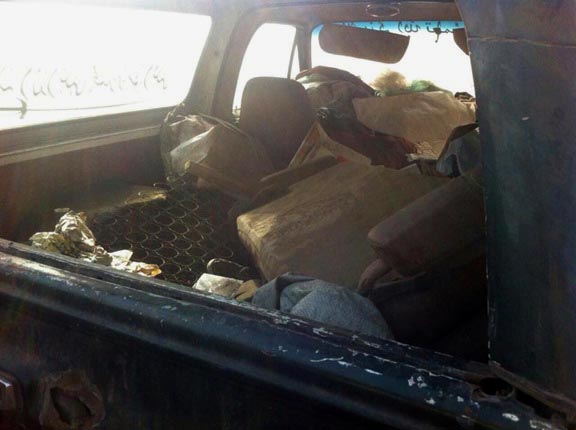
But what may be a fairly ordinary task in Western societies, manually fixing a car carries a social stigma in Cairo, both because it is considered low-class labor and because the work is seen as inappropriate for girls and women.
Repairing this car required forming personal relationships with low-income working-class men such as mechanics, electricians, and other service-people.
Not only was the project eye opening to social classes Lara had never personally interacted with, but also to the many ordeals of the Cairene society, including rampant bribery to legalize the ownership, as well as sexual harassment.
Obtaining the Truck
Like most abandoned cars, Lara assumed it had no current owner, and that claiming it as her own would be simple. This led her to calling a friend whose father owns a car towing service, and had the car towed to their garage.
Opposite to her thrill, her father was outraged when she responded to his inquiry about the dusty worn out car in their garage saying, “It’s my car.”
“Did you buy the car?” he screamed.
“No,” she replied. “I found the car and I took it to my garage!”
It wasn’t long before they both returned with the car to where it had peacefully rested for many years.
Relieved by the sight of the car, the doorman of the nearby building rushed at them crying, “I thought I was going to lose my job!”
This time, they met with the owner of the car whose natural response was, “You stole my car!” But Lara explained her intentions for fixing the car, and she closed the deal at LE 9,000 (approximately $1,200), a price she was more than happy to pay.
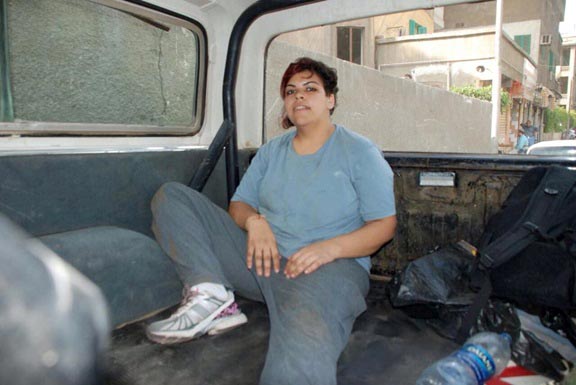
Community Response
By the time the repair process began, Lara was a full-time university student. Her involvement in the project required that she spends late and long hours with men in closed spaces, which is highly deemed taboo in Egypt.
Lara was surprised that her male friends were not supportive of her endeavor. They would often say that being a girl rendered her ill-suited for this project.
“You’re acting like such a man for doing this,” she remembers them telling her. Not understanding why a girl would want to work on a car as she did, they believed she was building a scandalous reputation for herself.
During one of the many failed test drives, a close friend told her: “I can sell this car for you. You don’t have to work on it anymore and in the morning it will be sold.” Lara, however, always adamantly refused to give up her car. “This was my car – I built it,” she protested.
“They thought, as a girl, I was going to get tired of it eventually,” she said.
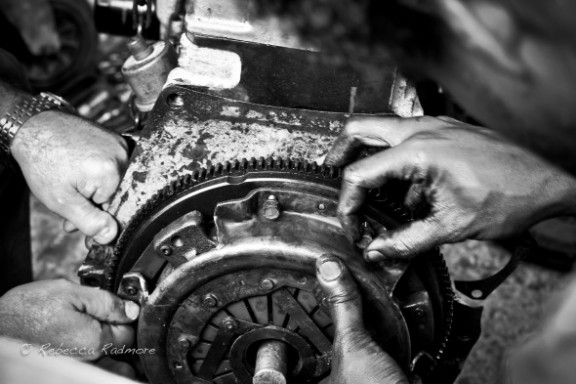
Getting Her Hands Dirty
After two months of studying the body of the car online and studying the malfunctioning aspects of her Chevy, she came to the conclusion that she had to replace all parts, from the engine to the car seats.
With barely any experience in physically working with a car, she brought the car to Mohammed Al Abyad, a mechanic who specializes in foreign cars. In doing so, she found an opportunity to learn all the ins and outs of car repair.
Almost every day for a year, she went to Al Abyad’s repair shop. She would finish classes, practice drumming, fulfill the hours of her part-time job, and then head over to Al Abyad’s from 6 p.m. until midnight.
The Chevrolet Blazer is an old, foreign model. The parts needed were almost completely unavailable in Cairo. With Al Abyad and some of his younger assistants, Lara would travel to different, low-income areas outside of Cairo to find car parts.
“I went to the worst and weirdest places in Cairo,” referring to the impoverished outskirts on Giza’s borders where junkyards and landfills can be found.
“To me, it was paradise,” she remembers.
Al Abyad, conservative and religious, found it strange that a young, higher-class girl wanted to work so intimately with the car. Lara says his reaction to her commitment to immersing herself in the project perplexed him.
The men in his shop often told her that she will tire herself with this work.
“Miss, you can just sit here and watch. Let us do all the work,” she remembers Al Abyad telling her.
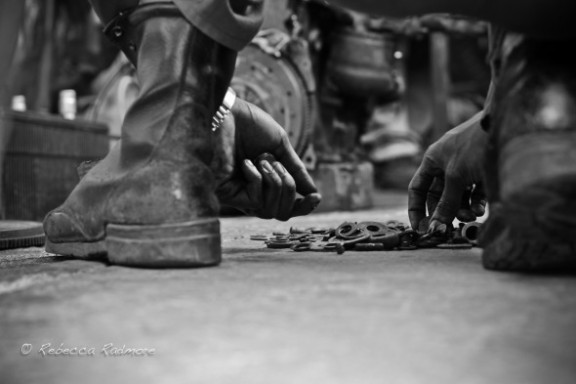
Becoming One Of The Guys
Any physical contact between men and women in public is generally considered taboo. “He wanted to show off by touching me, and mechanics aren’t supposed to touch girls,” she says. “It’s [generally] quite an insult.”
However, disregarding these social norms, the staff would touch her anyway.
One day at the repair shop, Lara had been taking a break from hours of work when the mechanic’s assistant, an 18 year-old boy who doesn’t go to school and makes a living working in the shop, came up to her and put his arm around her in front of group of passers-by.
Insulted, Lara kept quiet and didn’t vocalize her discomfort, worried that demonstrating resistance would reinforce the strangeness of her presence. The team would never accept her.
Unconvinced that a girl should be among them, Al Abyad and other mechanics would also make fun of her for her masculine demeanor. They often pretended that her involvement was normal, mockingly greeting her with derogatory terms for a woman, calling her “Mechanic” and “Uncle.”
But she ignored their comments until they grew accustomed to her being there. “It’s not easy for us to break the barrier. You need to let a lot of things pass,” she explains.
The economic disparities create divides between the different social classes in Egypt. Citizens from different socioeconomic classes do not often interact or understand each other. “They thought I was funny,” Lara said. “I was doing this for luxury, but this was their living.”
Lara, however, denied her learned social cues. “I’ve never met this social class, and suddenly I was working with them,” she says. “Once you deal with them, they’re not as bad as we make them.”
Finally denouncing Lara as an outsider, Al Abyad gave Lara a jumpsuit that matched his own to work on the engine together.
“Social standards in Egypt are so different. There is this gap between me and him, but when it comes to the car, we’re like family.”
One day on her way to Al Abyad’s, Lara was walking alone when a man following her grabbed her shirt, resisting her pushing and fighting her to lift it up. After screaming, Al Abyad, the mechanics, a nearby plumber and electrician all came running towards her, shouting and punched him for harassing her.
“I became one of them,” she says.
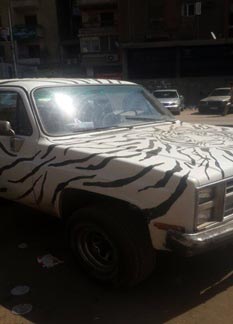
Putting The Chevy Back On The Road
After finishing several successful test runs on desert roads, the car was ready to be driven.
Painting the car white, she asked female artist friends to help her design the car. With a stationary store-bought paintbrush, she painted black stripes all over the body of the car. “I wanted it to have the face of a tiger,” she said.
Once the car was running regularly, she sent a text message with a picture of the car to the original owner, who then offered to buy the car back. But Lara refused.
“It’s my baby.”
Lara, now a senior studying Marketing at the Arab Academy for Science, Technology and Maritime Transport in Giza, works full time at Property Finder, a real-estate portal that connects property seekers with agents and brokers.
She spends her daylight hours exploring properties and meeting with customers around Cairo and her nights researching for more properties and potential homeowners and renters online.
With driving at the core of her work, Lara is grateful she does not have to share her car with her sisters.
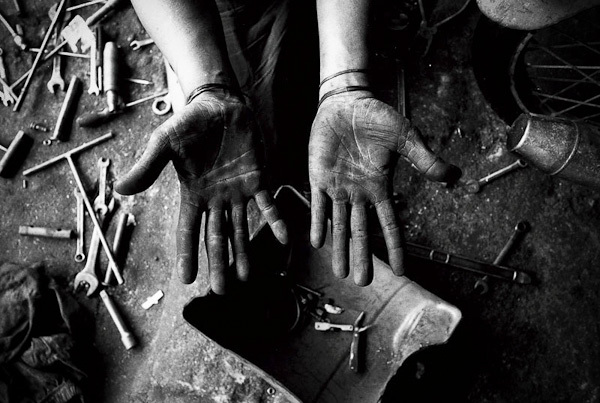



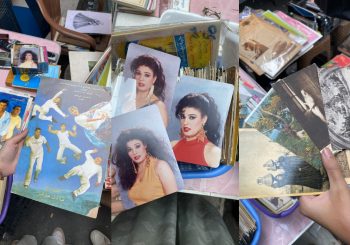


Comments (15)
1. i believe “denouncing” is the wrong word in this article.
2. lara should be very proud of herself, as everyone should be proud of her.
3. i have many friends seeking to buy or rent apartments, and i would be happy to use lara’s services as a broker. any assistance you can provide is appreciated.
Sure anytime contact me on Facebook ull find me by searching this email [email protected]
I can help out anyone looking for apartments
And thank u so much for ur words it was a pleasure reading them 😀
A very nice story, shukran.